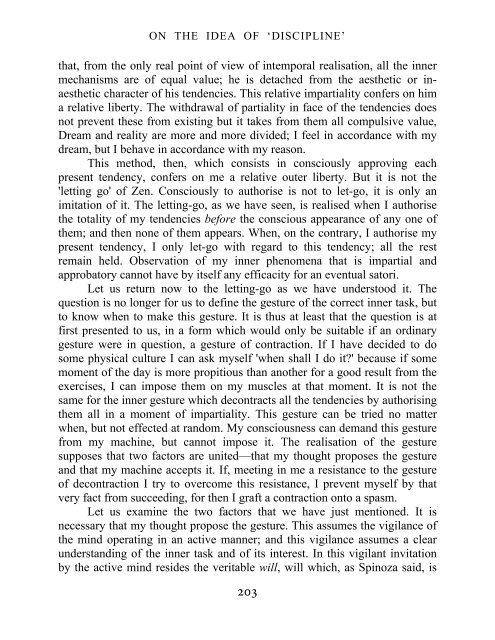The Supreme Doctrine - neo-alchemist
The Supreme Doctrine - neo-alchemist
The Supreme Doctrine - neo-alchemist
You also want an ePaper? Increase the reach of your titles
YUMPU automatically turns print PDFs into web optimized ePapers that Google loves.
ON THE IDEA OF ‘DISCIPLINE’<br />
that, from the only real point of view of intemporal realisation, all the inner<br />
mechanisms are of equal value; he is detached from the aesthetic or inaesthetic<br />
character of his tendencies. This relative impartiality confers on him<br />
a relative liberty. <strong>The</strong> withdrawal of partiality in face of the tendencies does<br />
not prevent these from existing but it takes from them all compulsive value,<br />
Dream and reality are more and more divided; I feel in accordance with my<br />
dream, but I behave in accordance with my reason.<br />
This method, then, which consists in consciously approving each<br />
present tendency, confers on me a relative outer liberty. But it is not the<br />
'letting go' of Zen. Consciously to authorise is not to let-go, it is only an<br />
imitation of it. <strong>The</strong> letting-go, as we have seen, is realised when I authorise<br />
the totality of my tendencies before the conscious appearance of any one of<br />
them; and then none of them appears. When, on the contrary, I authorise my<br />
present tendency, I only let-go with regard to this tendency; all the rest<br />
remain held. Observation of my inner phenomena that is impartial and<br />
approbatory cannot have by itself any efficacity for an eventual satori.<br />
Let us return now to the letting-go as we have understood it. <strong>The</strong><br />
question is no longer for us to define the gesture of the correct inner task, but<br />
to know when to make this gesture. It is thus at least that the question is at<br />
first presented to us, in a form which would only be suitable if an ordinary<br />
gesture were in question, a gesture of contraction. If I have decided to do<br />
some physical culture I can ask myself 'when shall I do it?' because if some<br />
moment of the day is more propitious than another for a good result from the<br />
exercises, I can impose them on my muscles at that moment. It is not the<br />
same for the inner gesture which decontracts all the tendencies by authorising<br />
them all in a moment of impartiality. This gesture can be tried no matter<br />
when, but not effected at random. My consciousness can demand this gesture<br />
from my machine, but cannot impose it. <strong>The</strong> realisation of the gesture<br />
supposes that two factors are united—that my thought proposes the gesture<br />
and that my machine accepts it. If, meeting in me a resistance to the gesture<br />
of decontraction I try to overcome this resistance, I prevent myself by that<br />
very fact from succeeding, for then I graft a contraction onto a spasm.<br />
Let us examine the two factors that we have just mentioned. It is<br />
necessary that my thought propose the gesture. This assumes the vigilance of<br />
the mind operating in an active manner; and this vigilance assumes a clear<br />
understanding of the inner task and of its interest. In this vigilant invitation<br />
by the active mind resides the veritable will, will which, as Spinoza said, is<br />
203




